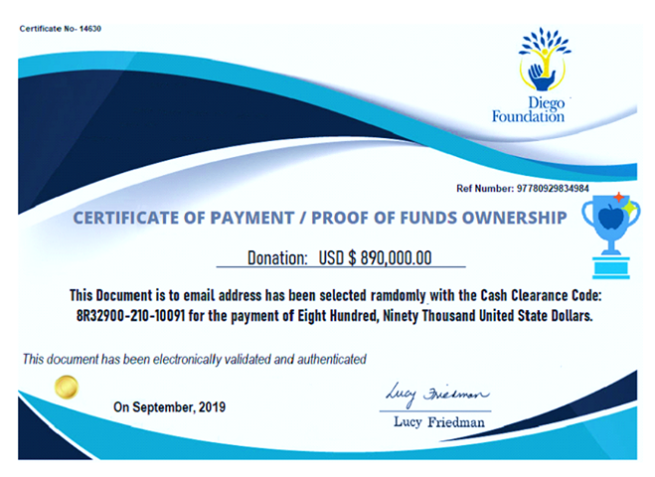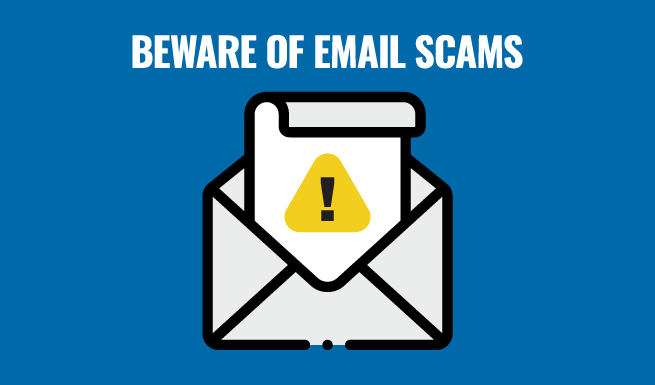Cybercriminals are notorious for taking advantage of holidays and major events to scam the public. It didn’t take long for scammers to try to take advantage of the COVID-19 pandemic. Some scam emails appear to be from WHO or the Centers for Disease Control and Prevention; others appear to be from nonprofits raising funds.
You can protect yourself and your loved ones if you know what to look out for to avoid getting scammed.
Three Things To Watch For
How can you separate the legitimate emails from the scams? Here are a few things to watch out for:
1. Spoofing:
The email might look like it’s from an organization you know and trust, except for:
- The name may be slightly different than the official name of the organization they’re spoofing.
- Perhaps the logo is just a little bit wrong, or it’s lower quality than you might expect from the organization.
- Check the “from” email address: Does it match the website URL of the organization that it purports to be from?
- Does the email footer have the organization’s physical postal address and a link to unsubscribe? Federal regulations require businesses to include these in their emails.
2. Asking for Information:
They ask you to provide your bank information or a copy of your drivers license, or they ask you to reply with your credit card number. Never provide financial information via email. A legitimate organization would never ask you for financial information via email.
3. Lack of Professionalism:
Misspellings, typos and bad grammar should trigger your mistrust.
Was It From The Foundation?
Unfortunately, some nonprofits, including The San Diego Foundation, have been the target of such phishing schemes. In a recent scam, people received messages via Facebook telling them that they were the recipient of $890,000, complete with an official-looking certificate that used a doctored version of The San Diego Foundation logo:

Scammers have also sent messages from email addresses ending with “@sandiego-foundation.com” and “@diegodonation.org,“ claiming that the recipient has been awarded large sums of money.
What You Can Expect From Us
- The San Diego Foundation is prohibited by law from providing grants to individuals, so individuals will never receive an unsolicited email from us stating the receipt of a monetary award. Scholarship awards are only given to those who apply through our Community Scholarship Program.
- Emails from us will always be clearly labeled and come from an @sdfoundation.org email address.
- We respect the safety of your private information and do not ask you for sensitive financial information via email.
Coronavirus-Related Scam Resources
- How to Avoid Coronavirus Phishing Scams (Consumer Reports article)
- Coronavirus Scams: What the FTC is Doing
What To Do If You Suspect a Scam
- Ask a trusted friend or colleague to look at the message and give you their honest assessment.
- The AARP Fraud Watch Network Helpline offers free advice and assistance by staff and volunteers who are trained specifically on how to help older Americans deal with scams: (877) 908-3360
- If the email claims to be from a charity, research it on a site like Charity Navigator or Guidestar. The San Diego Foundation donors can access free Guidestar reports via our MyTSDF online portal.
What To Do If You Responded To a Scam
If you or someone you know has responded to one of these scams, please report it right away to the FTC at www.ftccomplaintassistant.gov.
If you have shared personal information, keep an eye out for potential identity theft. Signs of identity theft include:
- Unfamiliar charges on your credit cards or bank accounts
- You stop receiving your bills or other mail
If you suspect someone is using your personal information, report it at www.identitytheft.gov/Information
If you believe money has been stolen from you, report it to your local police department.
If you have been scammed by an organization pretending to be The San Diego Foundation, please contact us to let us know, so we can take action.




